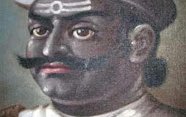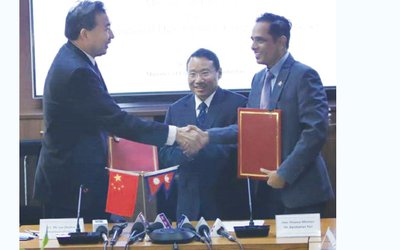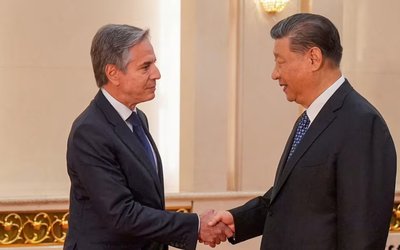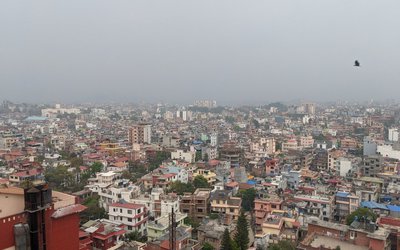Exactly four years ago, India's former Prime Minister I. K. Gujaral quite generously showered praises on Prachanda, Chairman of the Unified Communist Party of Nepal-Maoists (UCPN-M), during a social occasion in Delhi (Nov 20, 2006).
"I had read about revolutions only in history, but you actually led one successfully," he said of Prachanda.
Gujaral was quite optimistic about Nepal's future being safe in the hands of Prachanda who had emerged overground ending a 10-year long armed insurgency, and promising that his party would adopt democracy and peaceful means for socio-political transformation of the country.
Four years down the line, the hope a large spectrum of international community, like Gujaral, as well as a large section of Nepalis, pinned on his leadership has evaporated.
Prachanda's image at the moment is no different from any other leader’s in the country, especially the one tainted by corruption, inefficiency, too much talk and poor delivery.
Recently, he sent out a dangerously ambiguous message to all Nepalis and the international community keenly watching and working for the success of Nepal's peace process and future of democracy.
Upon his return from China, Prachanda gave an interview to The Kantipur and The Kathmandu Post national dailies, with a clear message that the 12-point agreement signed in Delhi in November 2005 should be substituted with a new and relevant one, mainly taking into account the political reality post-2008 Constituent Assembly election in which the UCPN-M became the largest party in the hung legislature. The 12-point agreement, that is considered as the basis of joint political movement in April 2006, its success and subsequent removal of the monarchy, had been facilitated by India following commitment by Prachanda that his party would renounce violence and adhere to democratic principles in the future. His willingness to transform UCPN-M into a democratic party was taken in its face value. That is at least Delhi’s excuse or justification for what it did. Gujaral's praise was a case in point.
But Prachanda’s latest statement advocating the need to bury the 12-point agreement without a forthright reiteration of his party's commitment to peace and democratic principle and process are seen as unilateral withdrawal from the political transformation that began five years ago. The Maoist Party was then a 'terrorist outfit' in the eyes of the government of India, a tag the U S government is yet to withdraw.
Yet, countries from India to U S, European Union and radical Maoist supporters like Norway went all the way to work for the success of the peace process--individually or collectively--with Prachanda as the indispensible Hero for the cause. His latest statement therefore not only sends a chill down the spines of Nepalis who were happy over the silence of guns post 12-point agreement's birth, but for the larger international crowd as well.
Close on the heel of Prachanda's statement, the government of India has officially lodged protest with Nepal about, what it says is, continued training given to Indian left extremists by the Nepali Maoists on ideology and arms. Nepali Maoists have denied this although they have publicly supported the Indian Maoist movement that basically aims at subverting the Indian state violently, a threat that Manmohan Singh says is the biggest to India's internal security. No doubt, opinions about the Maoist leaders among Nepal's international friends vary, but India's latest hard line may have a much larger implication, for Maoists and Nepal's fragile peace process. This also could be way of India trying to conveying message to the international community that it was not patronizing the Nepali Maoists at any point, but brought them together with other political parties for peace and democracy genuinely.
Britain's Prime Minister Tony Blair had set aside an objection raised by Nepal's visiting Prime Minister Sher Bahadur Deuba that the presence of the headquarters of the Revolutionaire International Movement (RIM)—an umbrella organisation of ultra left movement globally--in London needed to be taken seriously. His answer was simple: so long as they were not posing threat to U K's security, RIM's presence would not cause any headache to the British government.
Rather shockingly, Nepal Army now believes that a serving General of the British Army who used to frequently visit Nepal was not only in touch with the Maoist leaders right from the beginning, but he was also supplying some equipment to the insurgents. The US, on the other hand, had been consistently pursuing its anti-Maoist policy.
President George Bush is believed to have advised a Nepali Prime Minister that the government must 'find, fix and finish Maoists'.
Interestingly, China, which Prachanda has been trying to project as the solid backer of his policy and politics, was the only country that supplied arms to the Nepal Army during King Gyanendra's direct regime that was keen to go militarily against the Maoists. China, of course, has been asking Maoists and every other political party in Nepal to sort out their differences without outside interference, international community may not remain unaffected in the context of India's hardened response to Prachanda's political missive.
In China, which is generally perceived as a neighbour that rarely interferes in Nepal's internal affairs and one that pursues a pragmatic diplomacy, Maoists may be left with little, or no friends if their rift with India gets wider and more intense.
But the current exclusive players, mainly the Congress, UML and Maoists must realize that they have failed the people, and they stand discredited. Nepal will not be able to achieve peace and stability without all political and traditional or conventional forces including the former king sitting together and deciding what they can do for their nation.
- TANAHU HYDROPOWER PROEJCT: A Significant Achievement
- Apr 15, 2024
- AMBASSADOR HANAN GODAR: Sharing Pain With A Nepali Family
- Mar 30, 2024
- VISIT OF KfW AND EIB TO NEPAL : Mission Matters
- Mar 25, 2024
- NEPAL BRITAIN SOCIETY: Pratima Pande's Leadership
- Mar 24, 2024
- NEPAL ARMY DAY: Time To Recall Glory
- Mar 15, 2024
















